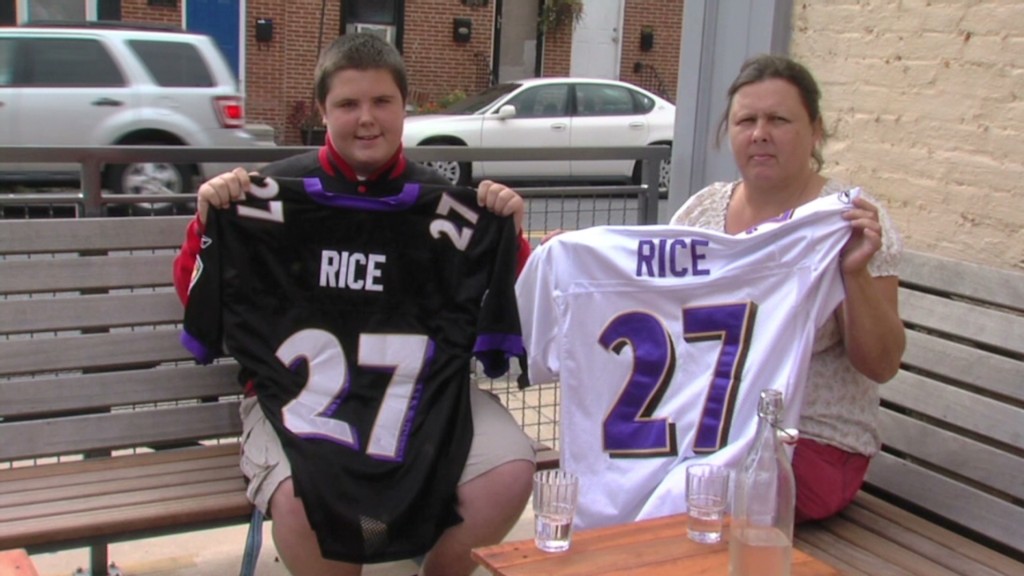
There are many reasons why people stay in abusive relationships, but one that makes it especially difficult for victims to leave is money.
If a victim is financially dependent on their abuser -- for income, for a roof over their head, even for health insurance -- walking away is made all the more difficult. They often must struggle to become financially self-sufficient, putting them at greater risk of falling into poverty and homelessness.
"I had to plan my escape for months before I even had a place to go and the money for the bus to get there. #WhyIStayed," domestic violence survivor Beverly Gooden, 31, tweeted Monday, in reaction to those who questioned why women like Janay Rice, the wife of Baltimore Ravens football player Ray Rice, hadn't left her husband after he had abused her.
Gooden's tweets have prompted tens of thousands of responses and a national conversation around the complex nature of domestic violence.
With no job, credit cards or money of her own, Gooden was reliant on her husband, who she had been dating since college, for basic living expenses. Plus, she had no personal credit history. So when she started secretly applying for apartments, she kept getting denied.
But she remained determined, setting aside a bit of cash whenever she had a chance, dipping into things like gas and grocery money.
Related: Hungry, tired and stressed out
Gooden was able to leave her husband in 2010 with the help of a local domestic violence shelter that she found online. The shelter provided her with emergency housing and passes for public transportation.
Within a few days, she rented a room in an apartment she found through Craigslist. After explaining her situation, the landlord allowed her to pay a small deposit and partial rent until she started receiving regular paychecks from the temp job she landed. Unable to qualify for a car loan, she bought a 1989 Toyota Camry for $450 to get to and from work each day.
Four years later, Gooden works in human resources and relishes being financially independent. "It feels so good to be able to say I'm in control now," she said. "Even if it is difficult, I'm in control."
Abusers often use money as a way to maintain power over their victims. They will withhold money, ruin the victim's credit, even forbid them to work so they don't have an independent source of income, according to the National Network to End Domestic Violence.
Before she left her abusive fiance last year, 25-year-old Ana Andrew had no access to her personal bank account, even though her paychecks were deposited into it each month. Instead, her fiance handled all of their money and gave her only a small allowance.
"He was in control of everything," Andrew said. "I was scared to go out on my own."
She reached her breaking point when he struck her while she was six weeks pregnant with their second child, breaking the cartilage in her left ear. She took her young son and fled to her mother's house and then to a domestic violence shelter run by the Urban Resource Institute.
Related: Retired women: 'How I'm getting by'
A year later, things are looking up.
After promptly closing her old bank account, she opened a new one at a new bank. Shelter staff helped her successfully apply for affordable housing. She got promoted at work, and is hoping to return to school to study to be a physician's assistant.
"If you push yourself you'll be okay," she said. "It's not an easy process, but it's better than your kids waking up without (a mom)."

Where to get help:
If you're a victim of domestic violence or know someone who is, the National Network to End Domestic Violence and the Allstate Foundation have developed a financial empowerment curriculum that can help. Here are some of their tips:
Find resources: Reach out to your local domestic violence program (find one near you by calling 1-800-799-SAFE) to learn about community resources that are available, such as local shelters, housing assistance or emergency assistance funds.
Many local programs provide a variety of other services from job training and financial literacy courses to child care and legal advice.
Check your credit: Get a copy of your credit report. If an abuser has used your identity to rack up debt, this could be considered identity theft and you may able to dispute the charges. Contact the Federal Trade Commission (1-877-FTC-HELP) helpline for more information.
Consider applying for a credit card or opening up your own bank account to start establishing your own individual credit history.
In addition, some domestic violence programs have created alternative lending programs to help women establish credit, said Kim Pentico, a senior economic justice specialist at NNEDV.
Gather important documents: If it is safe to do so, gather all of your important documents including your passport, birth certificate, Social Security card, bank statements and other financial records. Store them in a safe place like a friend or family member's house or a new safety deposit box in your name.
Without these documents, it can be more difficult to apply for a job or rent an apartment.
Correction: An earlier version of this story said that Ana Andrew was 6 months pregnant when she left her abuser. In fact, she was 6 weeks pregnant.
